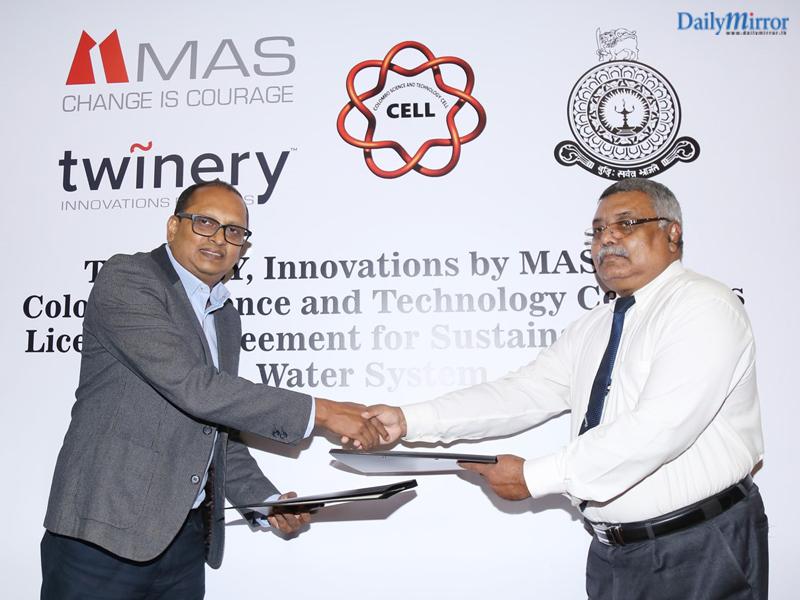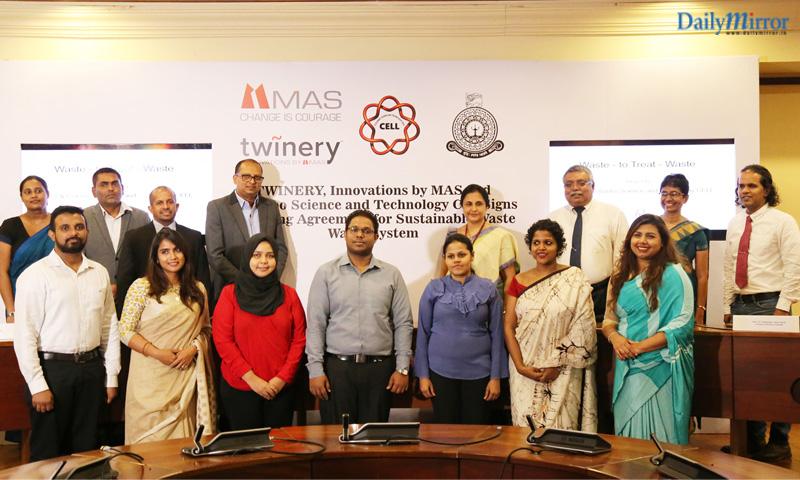 From Left - Ranil Vitarana, Chief Innovation Officer of MAS Holdings exchanging the signed Licensing Agreement with Prof. K. R. R. Mahanama – Dean, Faculty of Science, University of Colombo.
From Left - Ranil Vitarana, Chief Innovation Officer of MAS Holdings exchanging the signed Licensing Agreement with Prof. K. R. R. Mahanama – Dean, Faculty of Science, University of Colombo.
- ‘Waste-to Treat- Waste’; A revolutionary Waste Management Process for the Textile Industry using Aluminium industry’s waste
- A sustainable waste water management process which could be adapted by any industry
A revolutionary filter technology developed in Sri Lanka to use aluminium waste for treating waste-water in the textile industry. The new process is a sustainable closed-loop model which creatively uses the waste from aluminium anodizing to treat the waste-water from the textile industry and any final waste is converted into eco-bricks. A licensing agreement was signed between Twinery- the innovation arm of MAS Holdings and Colombo Science and Technology Cell of the University of Colombo recently to implement the process at the MAS Fabric Park. The research was conducted in collaboration with the Colombo Cell and MAS teams and funded by Twinery.
Dr. Dilushan Jayasundera, Principal Investigator of the project and Senior Lecturer (Physics) of the University of Colombo explained the idea behind the project. “It all began when Twinery, and the Colombo Science and Technology Cell of the University of Colombo teamed up to find a solution to find a cheaper, environmentally sound process for treating waste-water in the textile industry. The idea was to convert sludge from the aluminium industry as a filter material to treat the waste-water from the apparel industry. The proof of concept for the technology was developed through a series of undergraduate research projects with minimal funding of Rupees 16,000 in the department of Physics. Even though this was an undergraduate research, the outcome was impactful.”
The research was supported by Dr. Shashiprabha Vithanarachchi, Ms. Shalika Meedin and a team which included Ms. Kushani Hettiarachchi, Mr. Kasun Sankalpa (from UOC, Cell) and Mr. Ranil Vitarana, Mrs. Sarah Dole and Mr. Harsha Deraniyagala (from MAS).

Dr. Shashiprabha Vithanarachchi Consultant and Senior Lecturer (Chemistry) of the University of Colombo said, “In this process, solid waste from Aluminum anodizing industry is being converted with minimal processing to remove colour from dye containing waste-water. The textile industry currently uses costly agents to treat wastewater to ensure that it is meeting stringent local and international standards. This new finding has proved the possibility of partially or even fully replacing such agents with an Aluminium sludge based solution. The dissolving stage of the Aluminium sludge generates AlOH which is used for the adsorption-coagulation effects that is used for the filtration process while the inert matter is allowed to settle and is used for the exiting MAS eco brick process.”
“Removing the ultimate residues from the processes should be managed and it is used in the manufacturing process of eco bricks,” said Harsha Deraniyagala, General Manager, Hydro & Environment of MAS Fabric Park. “The qualitative analysis of waste ensures that the entire process is safe and managed within the local and international norms of environment safety. The final brick was tested and verified at the large-scale textile water treatment plant at MAS Fabric Park in order to ensure the industry applicability.”
Harsha Deraniyagala, said that there would be a significant reduction in the import costs of agents used for waste-water treatment. He also pointed to the significant advantage of being able to use the existing infrastructure to scale up the solution.
Sarah Dole, Head of IP Analytics & Project Manager, of Twinery said that “the key to successfully taking this innovative idea from lab scale to industrial level in a fast and agile manner is collaboration”.
Ranil Vitarana, Chief Innovation Officer of MAS Holdings said, “This is a homegrown sustainable solution for wastewater treatment with far reaching environmental, industrial and economic benefits for both the textile and aluminium industries as it has the potential to eliminate solid-waste from the aluminum industry that would have otherwise been disposed and is instead converted to a wastewater treatment material and eliminates the importation of other wastewater treatment material.”
With this innovation, the potential for total industrial sludge-waste of the aluminium industry and MAS is expected to be reduced by approximately 40 - 50%. When up-scaled, there is the possibility of totally eliminating all aluminium sludge-waste which as Dr. Jayasundera says, “would otherwise have gone into incineration or expensive end-processing.”
The project underscores the Importance of university-industry partnerships and the potential for producing home-grown solutions that could have a global impact.
 From Left - Ranil Vitarana, Chief Innovation Officer of MAS Holdings exchanging the signed Licensing Agreement with Prof. K. R. R. Mahanama – Dean, Faculty of Science, University of Colombo.
From Left - Ranil Vitarana, Chief Innovation Officer of MAS Holdings exchanging the signed Licensing Agreement with Prof. K. R. R. Mahanama – Dean, Faculty of Science, University of Colombo.